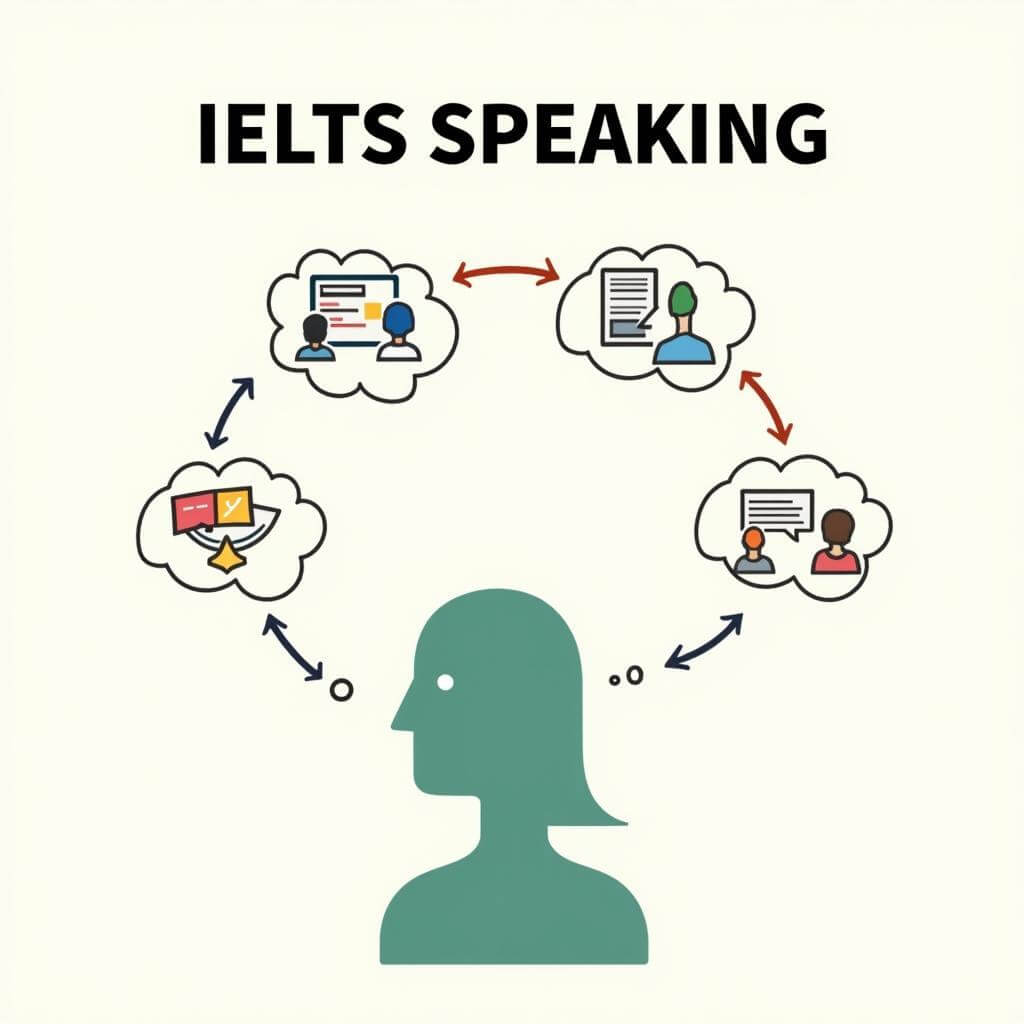Improving coherence in IELTS Speaking is crucial for achieving a high band score. This article explores effective strategies for enhancing your ability to speak coherently, helping you convey your ideas clearly and logically during the IELTS Speaking test.
Understanding the Importance of Coherence in IELTS Speaking
Coherence refers to the logical flow and connection between ideas in your speech. It’s a key factor that examiners assess when evaluating your IELTS Speaking performance. A coherent response demonstrates your ability to organize thoughts and express them in a structured manner, which is essential for effective communication in English.
 The importance of coherence in IELTS Speaking
The importance of coherence in IELTS Speaking
The Impact of Coherence on Your IELTS Score
Coherence directly influences your band score in the IELTS Speaking test. Examiners evaluate how well you can:
- Stay on topic
- Develop ideas logically
- Use appropriate linking words and phrases
- Maintain a clear train of thought throughout your response
By mastering coherence, you can significantly improve your overall performance and increase your chances of achieving your desired band score.
Key Strategies for Improving IELTS Speaking Coherence
1. Develop a Strong Opening Statement
Start your response with a clear and concise opening statement that directly addresses the question. This sets the tone for your entire answer and helps you stay focused on the main topic.
Example:
Question: “Describe a memorable trip you’ve taken.”
Opening statement: “One of the most unforgettable journeys I’ve experienced was my backpacking adventure through Southeast Asia last summer.”
2. Use Appropriate Linking Words and Phrases
Incorporate transitional phrases to connect your ideas smoothly. This helps create a logical flow in your speech and makes it easier for the examiner to follow your train of thought.
Some useful linking phrases include:
- To begin with…
- Moreover…
- On the other hand…
- As a result…
- In conclusion…
How to use linking phrases in IELTS writing task 2 can also be applied to improve your speaking coherence.
3. Organize Your Ideas Logically
Before you start speaking, take a moment to mentally organize your thoughts. A simple structure can help you present your ideas more coherently:
- Main point
- Supporting details or examples
- Personal opinion or conclusion
This approach ensures that your response follows a logical progression, making it easier for the examiner to understand and assess your ideas.
4. Practice the Art of Signposting
Signposting involves using phrases that indicate the structure of your response. This technique helps the listener anticipate what’s coming next and follow your train of thought more easily.
Examples of signposting phrases:
- “There are three main reasons why I believe this…”
- “Firstly… Secondly… Lastly…”
- “Let me elaborate on that point…”
5. Develop Your Ideas Fully
Avoid jumping from one idea to another without fully explaining each point. Take the time to elaborate on your thoughts, provide relevant examples, and explain the reasoning behind your opinions.
 Developing ideas fully in IELTS Speaking
Developing ideas fully in IELTS Speaking
6. Stay on Topic
One of the most critical aspects of maintaining coherence is staying focused on the question at hand. Avoid going off on tangents or introducing irrelevant information. If you find yourself straying from the topic, gently steer your response back to the main point.
How to stay on topic in IELTS speaking answers provides valuable tips for maintaining focus during your responses.
7. Use Personal Experiences and Examples
Incorporating personal anecdotes and real-life examples can significantly enhance the coherence of your responses. These examples provide context and make your ideas more relatable and easier to follow.
Dr. Emma Thompson, a renowned IELTS Speaking coach, emphasizes: “Personal stories create a narrative thread that naturally improves coherence. They help candidates connect their ideas more effectively and engage the examiner on a more personal level.”
8. Practice Active Listening
During Parts 1 and 3 of the IELTS Speaking test, pay close attention to the examiner’s questions. This will help you provide more relevant and coherent responses. If you’re unsure about a question, don’t hesitate to ask for clarification.
9. Utilize Complex Sentence Structures
Incorporating a variety of sentence structures can enhance the sophistication and coherence of your speech. Practice using compound and complex sentences to connect related ideas more effectively.
Mastering complex sentence patterns can help you improve both your speaking and writing coherence.
10. Develop Your Vocabulary
A rich vocabulary allows you to express your ideas more precisely and maintain coherence throughout your response. Focus on learning synonyms, idiomatic expressions, and topic-specific vocabulary to enhance your ability to articulate your thoughts clearly.
Advanced Techniques for Enhancing IELTS Speaking Coherence
1. Implement the PEEL Technique
The PEEL (Point, Explanation, Example, Link) technique is an effective strategy for structuring your responses:
- Point: State your main idea
- Explanation: Elaborate on the point
- Example: Provide a relevant example
- Link: Connect back to the main topic or transition to the next point
This structured approach ensures that your ideas flow logically and coherently.
2. Utilize Rhetorical Questions
Incorporating rhetorical questions can help you transition between ideas and maintain the listener’s engagement. For example:
“So, why is this issue so important? Well, let me explain…”
3. Practice Debates and Discussions
Engaging in debates and discussions on various topics can significantly improve your ability to speak coherently under pressure. This practice helps you think on your feet and organize your thoughts quickly.
Developing fluency by practicing debates offers valuable insights into how this technique can enhance your speaking skills.
 IELTS Speaking debate practice
IELTS Speaking debate practice
4. Record and Analyze Your Responses
Record yourself answering IELTS Speaking questions and then listen to your responses. Pay attention to areas where your speech lacks coherence and work on improving those aspects. This self-analysis can be incredibly beneficial for identifying patterns and areas for improvement.
Conclusion
Mastering coherence in IELTS Speaking is a crucial step towards achieving a high band score. By implementing these strategies and consistently practicing, you can significantly enhance your ability to communicate clearly and effectively during the test. Remember, coherence is not just about using the right words, but also about organizing your thoughts logically and presenting them in a structured manner.
As you continue to work on your speaking skills, keep in mind that coherence goes hand in hand with other important aspects of language proficiency. Improving task 2 argument clarity in IELTS Writing can also help you develop skills that translate well to speaking coherently.
With dedication and the right approach, you can develop the confidence and skills necessary to excel in the IELTS Speaking test and beyond. Keep practicing, stay focused, and remember that coherent communication is a valuable skill that will serve you well in all aspects of your English language journey.


